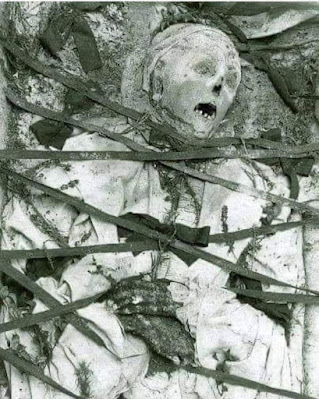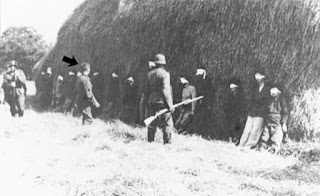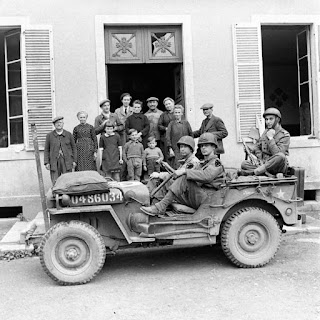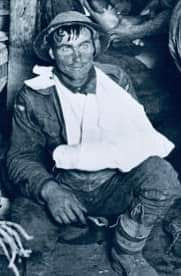April 5, 1945: On the western front, 18 US Divisions began to clear the Ruhr pocket in Germany.
US 1st Army hammers the Ruhr pocket and continues pushing east around Warburg and Kassel while US 9th Army attacks across the Weser River at Hamelin and continues assaulting Ruhr pocket. Patton’s US 3rd Army captures Muhlhausen and Meiningen while US 7th Army captures Gemuenden, pushes toward Schweinfurt, and attacks into Heilbronn. British 2nd Army captures Lingen and Osnabruck, and Canadian 1st Army crosses Twenthe canal and captures Almelo. French 1st Army begins attacking toward Pforzheim.
Serving in the Medical Detachment of the 48th Armored Infantry Battalion, 7th Armored Division in Alemert, Germany, Corporal Thomas J. Kelly repeatedly exposes himself to hostile fire in order to drag wounded men to safety. For these actions, he is awarded the Medal of Honor seven months later, on November 1, 1945. Here is his citation:
“He was an aid man with the 1st Platoon of Company C during an attack on the town of Alemert, Germany. The platoon, committed in a flanking maneuver, had advanced down a small, open valley overlooked by wooded slopes hiding enemy machineguns and tanks, when the attack was stopped by murderous fire that inflicted heavy casualties in the American ranks. Ordered to withdraw, Cpl. Kelly reached safety with uninjured remnants of the unit, but, on realizing the extent of casualties suffered by the platoon, voluntarily retraced his steps and began evacuating his comrades under direct machinegun fire.
He was forced to crawl, dragging the injured behind him for most of the 300 yards separating the exposed area from a place of comparative safety. Two other volunteers who attempted to negotiate the hazardous route with him were mortally wounded, but he kept on with his herculean task after dressing their wounds and carrying them to friendly hands. In all, he made 10 separate trips through the brutal fire, each time bringing out a man from the death trap.
Seven more casualties who were able to crawl by themselves he guided and encouraged in escaping from the hail of fire. After he had completed his heroic, self-imposed task and was near collapse from fatigue, he refused to leave his platoon until the attack had been resumed and the objective taken. Cpl. Kelly's gallantry and intrepidity in the face of seemingly certain death saved the lives of many of his fellow soldiers and was an example of bravery under fire.”
He died at age 65 and was buried in Arlington National Cemetery, Arlington County, Virginia.
Above Germany, US 8th Air Force attacks two munitions dumps with 305 bombers, Bayreuth with 112 bombers, Plauen with 151 bombers, an airfield with 59 bombers, an electric plant with 13 bombers, Furth with 54 bombers, Nurnberg with 308 bombers, and targets of opportunity with 33 bombers. US 15th Air Force attacks rail traffic with P-51 fighters.
On the eastern front, Soviet 3rd Ukrainian Front cuts the rail line from Linz to Vienna, occupied Austria. Soviet 2nd Ukrainian Front and 3rd Ukrainian Front attack German 6th SS Panzer Army around Vienna. On the fifth day of the Soviet 3rd Belorussian Front’s artillery bombardmen on Königsberg, Germany, a break in the weather allows Soviet aircraft to join in on the attack. By this time, German defenses can offer little opposition to enemy aircraft.
Moscow notifies Japanese ambassador the 1941 non-aggession pact with Tokyo will not be renewed.
On the west coast of Italy, American units from US 5th Army begin diversionary attacks to the north near Massa, south of La Spezia. British 56th Infantry Division (part of 8th Army) attacks German positions near Lake Comacchio in northern Italy. US 12th Air Force aircraft attack transportation lines and other targets in the Po valley and throughout northern Italy, including support for ground operations around Massa Lombarda and US 15th Air Force attacks Alessandria, Brescia, Turin, and Udine.
Second Lieutenant Vernon Baker, serving in the 366th Infantry Regiment, part of the 92nd Infantry Division, participated in an attack on the German stronghold of Castle Aghinolfi. During the assault, Baker led his heavy weapons platoon through German army defenses to within sight of the castle, personally destroying a machine gun position, two observation posts, two bunkers, and a network of German telephone lines along the way. It was for these and other actions including leading a battalion advance under heavy fire that he was later awarded the Medal Of Honor. Here is his citation:
“For extraordinary heroism in action on 5 and 6 April 1945, near Viareggio, Italy. Then Second Lieutenant Baker demonstrated outstanding courage and leadership in destroying enemy installations, personnel, and equipment during his company's attack against a strongly entrenched enemy in mountainous terrain.
When his company was stopped by the concentration of fire from several machine gun emplacements, he crawled to one position and destroyed it, killing three Germans. Continuing forward, he attacked an enemy observation post and killed two occupants. With the aid of one of his men, Lieutenant Baker attacked two more machine gun nests, killing or wounding the four enemy soldiers occupying these positions. He then covered the evacuation of the wounded personnel of his company by occupying an exposed position and drawing the enemy's fire. On the following night Lieutenant Baker voluntarily led a battalion advance through enemy mine fields and heavy fire toward the division objective. Second Lieutenant Baker's fighting spirit and daring leadership were an inspiration to his men and exemplify the highest traditions of the Armed Forces.”
Baker died at his St. Maries, Idaho, home on July 13, 2010 after a long battle with cancer. He had been near-death due to brain cancer in 2004 but had recovered. His funeral at Arlington National Cemetery on September 24, 2010, was attended by three other Medal of Honor recipients, and his family, for whom funds for them to travel to Arlington, Virginia were raised by their local community.
Private First Class Sadao Munemori, serving in Company A, 100th Infantry Battalion, 442d Combat Team, earned the Medal Of Honor in northern Italy by taking out two machine guns nests then sacrificing his life by jumping on a live grenade to protect two fellow soldiers. Here is his citation:
“He fought with great gallantry and intrepidity near Seravezza, Italy. When his unit was pinned down by grazing fire from the enemy's strong mountain defense and command of the squad devolved on him with the wounding of its regular leader, he made frontal, one-man attacks through direct fire and knocked out two machine guns with grenades. Withdrawing under murderous fire and showers of grenades from other enemy emplacements, he had nearly reached a shell crater occupied by two of his men when an unexploded grenade bounced on his helmet and rolled toward his helpless comrades. He arose into the withering fire, dived for the missile and smothered its blast with his body. By his swift, supremely heroic action Pfc. Munemori saved two of his men at the cost of his own life and did much to clear the path for his company's victorious advance.”
Pictured: A Sherman tank of The Canadian Grenadier Guards, Almelo, Netherlands, April 5th 1945 - the sign they’re holding translates as ‘Wehrmacht commandant's office’.; The cavalry recon squadron of 9th Armored Division occupies the town square in Pegau, Germany on April 5, 1945.; General Bradley and General Patton at Bastogne, April 5, 1945.; Thomas J. Kelly, Corporal, United States Army, awarded the Medal of Honor for actions in World War II.; Grave of Medal Of Honor recipient Vernon Baker at Arlington National Cemetery.; Grave of Medal Of Honor recipient Sadao Munemori.















Comments
Post a Comment